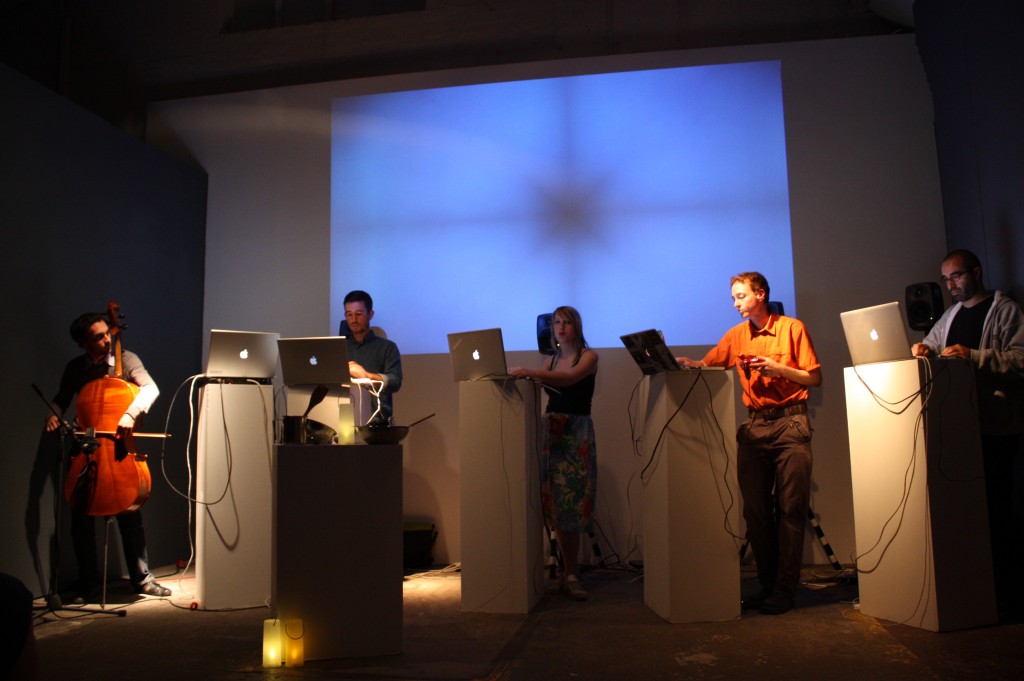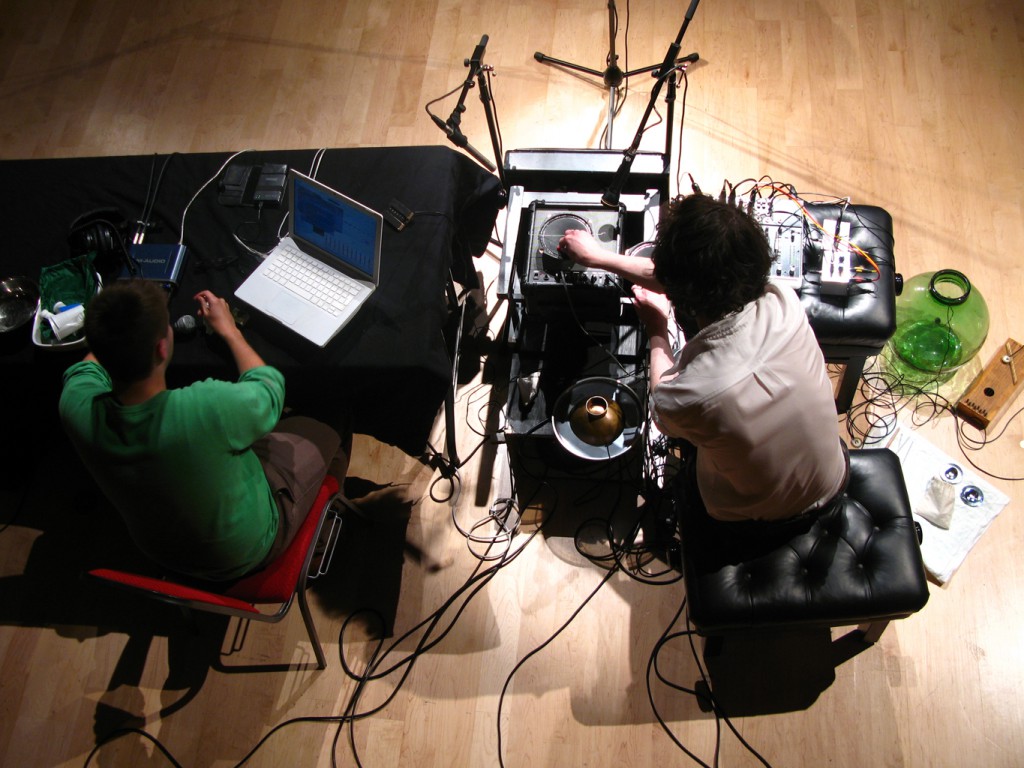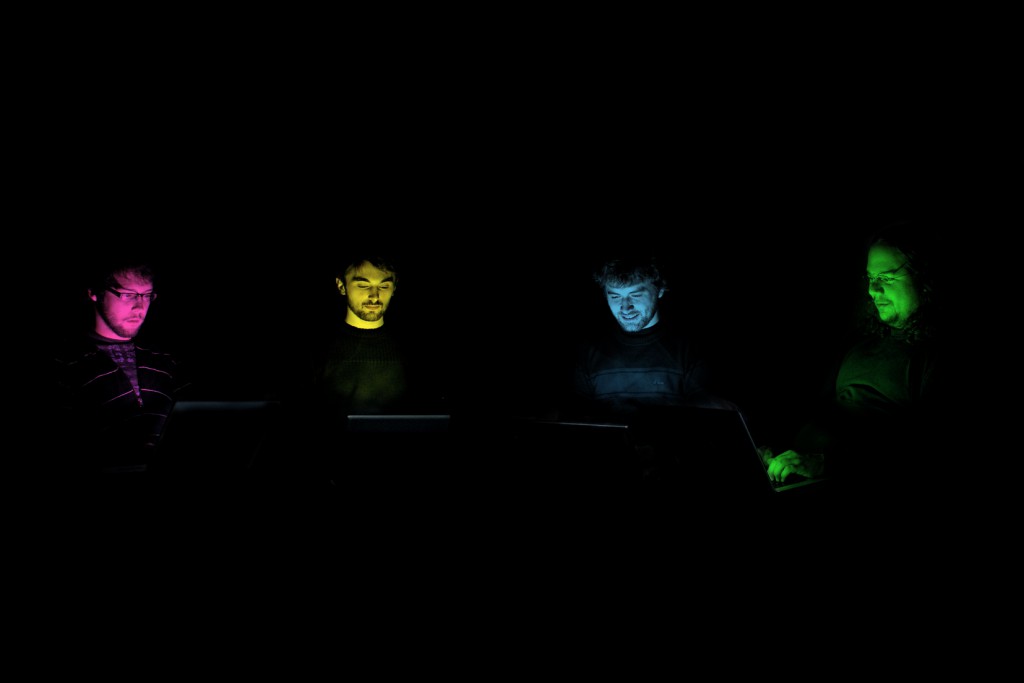Next up in our performer conversations with journalist Ross Cotton is local laptop band BiLE (Birmingham Laptop Ensemble).
BiLE will be performing a live set at Network Music Festival consisting of a sonic battle and the premiere of Act II of the world’s first “Laptopera” (or opera for laptops)!
Enjoy!
///////////////////////////////////////////////////////////////////////////////////////////
Birmingham Laptop Ensemble (BiLE) are a team of experimental sound performers.
Focusing on instrumental and electroacoustic music, the ensemble improvise and interact together to generate and manipulate new ways of expression for live performances.
The six piece (consisting of Shelly Knotts, Julien Guillamat, Charles Celeste Hutchins, Chris Tarren, Norah Lorway and Iain Armstrong), are also accompanied by glitch artist Antonio Roberts, who crafts supporting visual wonders for BiLE’s on stage shows.

“We are playing two pieces [at Network Music Festival]”, says laptop enthusiast Shelly Knotts.
“One of them we’ve performed at two other festivals, which is our XYZ piece, and then we are doing one of Les’s pieces.”
“It’s a premiere”, says fellow member Charles Celeste Hutchins.
“It’s a ‘Laptopera’, we’re doing just act two of it, but as far as I know, it’s the first ever opera for laptops!”, he says.
“A guy I really like called Gino Robair did an improvised opera for really open instrumentation.
“There were guys performing it with singers and laptops.
“I also really like things with spoken text.
“So I thought, what if we did a similarly open opera thing with computers, but with more text”, says Les.
Shelly continues by explaining the story behind XYZ, which will also be performed at Network Music Festival, “we wrote that for the New Interfaces for Musical Expression conference in Oslo in May.
“The idea was that we’d all be able to control each other’s sounds, with an iPhone or using a Wiimote for example.
“I wanted to think of a way that wasn’t just sharing sounds or chatting to each other during the performance”, says Shelly.
“So this is a way we could be really communicating.
“I’ve got my iPhone, if I move it one way, it controls one piece of sound, if I move it another way, it controls another part of the sound in three dimensions.
“And then, everybody in the ensemble has a sound which has three things you can control on it.
“Then I can say, I’m going to control the pitch on Les’s sound, the resonance on Chris’s and density on Julien’s. So it’s 3 dimensions with the iPhone controlling those things.
“And we’re all fighting the whole time to control each other’s sounds.”
“It’s like a big sonic battle!”, adds Julien.
“Sonic arm wrestle was the working title!”, says Shelly.
With elements of both art and music within their sound, BiLE fuse together two creative outlets and present their experiments through performance.
“It’s very much a musical background that we all come from, and I think that translates into the approach that we take” says Iain.
“I was a classical violinist.”
Shelly adds, “and I came from writing instrumental music, to doing electronics, to doing BiLE.
“We’re more about exploring other avenues alongside the other things that we are doing. But the stuff that we’re doing in BiLE is definitely influencing my other compositions. Working with a group of composers with other ideas just opens your eyes to other avenues.”
“We are always trying to create interesting music”, says fellow member Chris.
“We’re not about technical fetishes or using technology for the sake of it, we are just using technology as a way of enabling us to do interesting and new things.
“The technology is much more of an enabling factor, rather than a necessity.
“It’s more about new ways of expression, rather than genre based roots,” he says.
“The difference is that we aren’t coming from a fine art background”, concludes Iain.
The sound of BiLE is very unique and unusual to most listeners, as they continuously adapt layers to their pieces with occasional improvisational qualities.
“We generally rehearse quite a lot, so there’s always an amount of structure”, says Julien.
“We know what the aim is we want to create in a piece.”
Les continues, “and when we start improvising, we have a stopwatch going. “So people always have an idea of how long we are going for.
“It’s kind of thinking about musical forms always happening.”
“When we’re nearing the climax, we’ll say go on! Go crazy! Do something! Push the volume up!”, adds Julien.
“We always have a score”, says Shelly.
“And during the performance, we’ve got a chat open.”
“We can always type at each other if someone’s doing something totally crazy”, says Les.
“And we have hand signs for things like ‘Help! My computer has crashed!’.”
Live sampling is also a huge part of the BiLE collective, feeding electroacoustic elements into their sound.
Iain explains further, “we are all designing our own instruments, and that can vary from piece to piece depending on the demands of the scores.
“If you need to sample something live and apply some kind of process to it, then generally we’ll write a patch that meets that brief.
“Then there’s flexibility; What you do to the sound is up to you.
“Whether you want to make it more extreme or pitched based.”
And it seems that other samples used by the group are much more obscure than you could ever imagine.
“I had porn sounds once”, says Les.
“You had some good vocal samples as well, people being racist or homophobic?”, adds Shelly.
“Oh yeah”, Les continues.
“They were all my offensive samples.
“I had one from the BNP which I didn’t end up using because it was just too much.
“And then some representative in the states talking about how gay people are like a cancer upon society, which is a one way speech.
“And then George Bush talking about terrorism”, he says.
“But the classic is Chris’s cheese grater!”, adds Julien.
“I still haven’t got my cheese grater back!, I can’t grate cheese!”, jokes Chris.
“And generally, some of the pieces that we play, define the material that we use”, says Iain.
“So for the Partially Percussive one, we use metallic, percussive instruments like kitchen utensils.”
“But I think all this comes from us being composers”, says Shelly.
“When I go out, I have my microphone with me.”
“When we were in Venice, everybody had their recorders.
“They’re always doing it it seems!”, explains Antonio.
And what future projects are BiLE looking to pursue?
“It would be quite fun to do a Chinese whispers piece,” says Les.
“By modifying the sounds that everybody else was making.”
“So that’s basically to chain the Laptops together”, explains Shelly.
“Whatever Les makes gets sent to Iain, then whatever Iain does to it gets sent to me, then whatever I do gets sent to Julien, and then there will be one person at the end who will be playing the eventual sounds!”
“I’m personally trying to work out ways of having more control [with Laptops]”, says Iain.
“For me, it’s about finding ways of making it more performative.
“That’s the thing with the Ensemble, it allows you to develop these ways of playing.
“And it’s also easier to do that as a group rather than on your own, because there are limitations”, he says.
“Laptop performance is relatively a new area”, says Shelly.
“People are still working out ways to make it an interesting performance as well as an interesting sound. “The thing I find interesting about BiLE is writing a piece that is specifically for a group of laptops, all connected via a Network.
“And thinking about the possibilities that you can have from that specifically.
“We are all mixed ability coding types, the participation is about what you can bring musically to the group.” says Shelly.
“That’s what appealed to me”, says Iain.
“There was no demand from the group saying you need to be excellent at coding, just as long as you can make sounds and you can control it.
“I think that’s what’s great about the way we work.” concludes Iain.
by Ross Cotton – Freelance Music Journalist – http://domesticcity.posterous.com/






